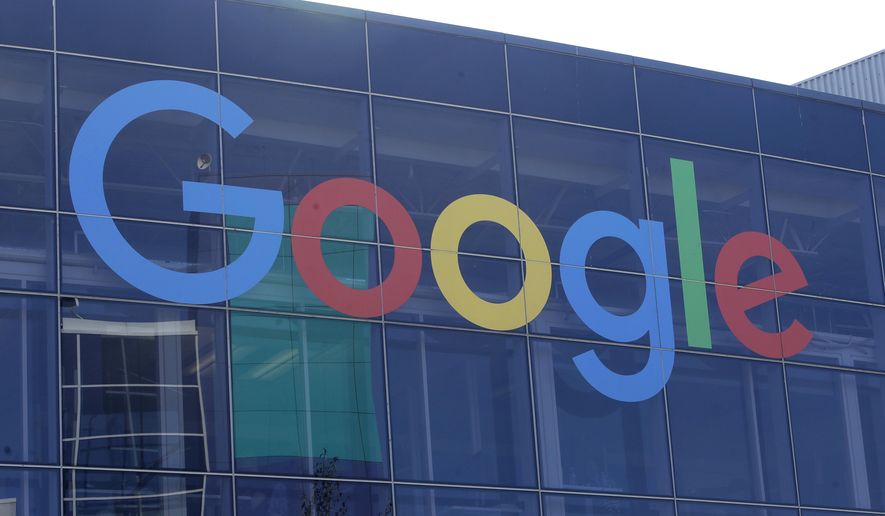Oracle sees a chance to gain the upper hand in a Supreme Court copyright battle with Google because the search engine giant relaxed tight control of its services to collaborate with Apple to combat the new coronavirus, The Washington Times has learned.
Oracle is examining Google’s collaboration with Apple for leverage against Google in a pending Supreme Court intellectual property battle, Google v. Oracle, which was postponed because of the coronavirus outbreak.
Oracle told The Washington Times that Google “certainly has a pretty selective view about when interoperability is important,” and Oracle said it was “pursuing this angle” to help it prevail at the Supreme Court.
Oracle said it has not yet found a connection between the tech at issue in Google’s court case and the tech involved in Google’s work with Apple.
Google disputes the assertion that there is anything discoverable in its collaboration with Apple that could undermine its Supreme Court arguments against Oracle.
“Oracle is wrong,” said Jose Castaneda, Google spokesman. “Our contact tracing project actually shows how shared [application programming interfaces] enable interoperability across platforms, which has been our long-held position. We look forward to making this case to the Supreme Court.”
Google and Apple are making their phones interoperable like never before to create a Bluetooth-based system to track people’s exposure to coronavirus. Interoperability is also at issue in the landmark Google v. Oracle case, which presents unprecedented questions for the nation’s highest court about intellectual property, copyrightability, and fair use.
If Google’s teamwork with Apple requires it to inadvertently undermine their previous arguments, the tech titans’ collaboration could help save lives while potentially costing Google its court battle.
Asked whether Google’s new collaboration with Apple has affected his prepared arguments before the Supreme Court, Google lead counsel Tom Goldstein referred the question to Google.
At issue in the Supreme Court case are more than 11,000 lines of computer code, which Oracle claims Google stole. Google disputes Oracle’s claims, and the battle has raged for nearly a decade in the courts.
Prior to the Supreme Court’s decision to postpone the Google v. Oracle case, Oracle Executive Vice President Ken Glueck told The Times that Google made its fortune copying other people’s work. Mr. Glueck said Google should be perceived as an advertising company not a technology company and said, “Think Don Draper not da Vinci.”
“They’ve been copying since, heck, the entire beginning of Google was one big copying exercise when they started to index and record the internet,” Mr. Glueck said. “Now it turns out that wasn’t a copyrighting question, but whether it’s indexing and recording the internet or literally photocopying every book in libraries, they benefit from utilizing other people’s content — but there’s a line there and that line is right here, right now.”
Google’s allies say the company has done nothing wrong and the tech titan’s teaming with Apple ought not interfere with the Supreme Court case.
Daniel Takash, Niskanen Center regulatory policy fellow, said the only overlapping issue in Google’s court case and its collaboration with Apple involves Google’s application programming interfaces (APIs). Mr. Takash said he does not think the Google-Apple collaboration will affect the Supreme Court case’s outcome. The Niskanen Center has previously filed a brief with the Supreme Court in support of Google.
“Here’s the scenario I can imagine where Google would undermine its claims in Google v. Oracle: The public health agencies that develop the apps used for the tracing would use the API or some other piece of code owned by Google for their app, and Google would claim copyright infringement and/or demand a licensing fee,” Mr. Takash said in an email.
Mr. Takash said this would be unlikely because it would appear to contradict Google’s stated intentions, undermine the contact-tracing project and create a crush of negative public relations for Google.
He said the only other scenario where Google’s work with Apple could undo its court arguments would involve Google claiming copyright infringement and suing the maker of a non-Android operating system using their own APIs to become part of the contact-tracing project.
“Even if this highly unlikely scenario were to play out, that’s related to the ability of Oracle to claim hypocrisy on Google’s part, which only counts for a win in the court of public opinion,” Mr. Takash said. “As far as [the Supreme Court] goes, I don’t think it’d make much difference one way or the other.”
• Ryan Lovelace can be reached at rlovelace@washingtontimes.com.




Please read our comment policy before commenting.